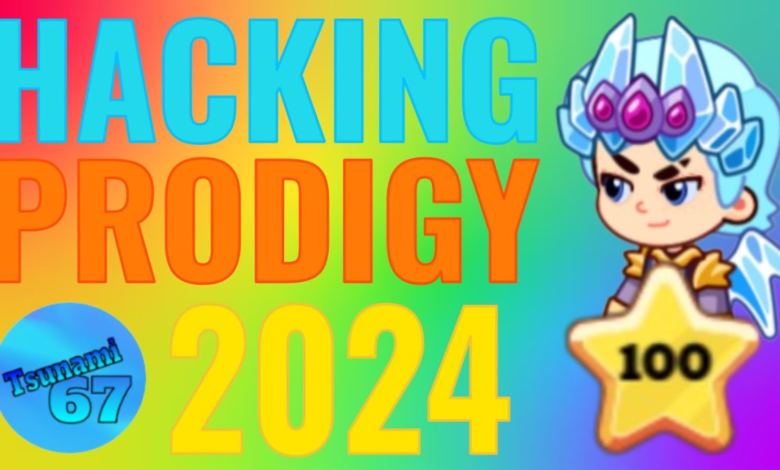Prodigy Hacks: Exploring Shortcuts, Strategies, and Ethical Considerations

prodigy hacks has become a beloved platform for learning math through gameplay. It takes students on a magical journey, making math challenges feel like epic battles and adventures. But as with any game that involves levels, rewards, and progression, players are seeking “prodigy hacks” – shortcuts and exploits to advance more quickly or unlock items without doing the required work.
The idea of “hacking” Prodigy raises interesting questions about gaming, education, and ethics. In this article, we’ll explore everything there is to know about Prodigy hacks: what they are, why students are drawn to them, the difference between legitimate strategies and cheats, and the consequences of taking shortcuts in an educational game.
What is Prodigy? A Math Game That Feels Like an Adventure
Before we dive into the world of Prodigy hacks, it’s essential to understand what Prodigy is and why it’s so popular. Prodigy isn’t just a regular math-learning platform – it’s an immersive game that combines education with fun. In Prodigy, players take on the role of a wizard, battling monsters and completing quests to unlock new levels and rewards. But here’s the twist: every battle and challenge requires players to solve math problems.
The Appeal of Prodigy for Students
The reason Prodigy has gained so much popularity is simple – it makes math fun. Instead of solving boring equations on paper, students get to immerse themselves in a colorful, interactive world where math is the key to success. Whether it’s solving equations to cast a spell or answering geometry questions to defeat a creature, the game integrates math into every aspect of its gameplay.
For many students who struggle with traditional math lessons, Prodigy offers a way to practice their skills in a less intimidating environment. The fact that the game adapts to their skill level ensures that they aren’t overwhelmed by difficult problems, and they can build confidence over time. Plus, the reward system – with its collectible items, characters, and pets – keeps students motivated to keep playing (and learning).
The Role of Gamification in Prodigy
One of the reasons Prodigy is so successful is its use of gamification. Gamification is the process of turning tasks (like learning math) into a game-like experience, with rewards, levels, and achievements. In Prodigy, every math problem solved brings the player closer to leveling up, earning in-game currency, or unlocking cool items. This keeps students engaged and motivated to continue practicing their math skills.
But gamification can also create a certain pressure. When players see their friends leveling up faster or unlocking rare items, the desire to keep up or move ahead can become intense. This is where some students start looking for shortcuts – or “hacks” – to speed up their progress.
What Are Prodigy Hacks?
When we talk about “prodigy hacks,” we’re referring to any method, trick, or exploit that players use to bypass the normal progression of the game. These hacks can range from completely legitimate tips and strategies to unethical cheats and modifications that go against the game’s terms of service.
The Different Types of Prodigy Hacks
There are several types of hacks that players might come across when searching for ways to advance in Prodigy. It’s important to differentiate between these types to understand their ethical implications and consequences.
- In-Game Tips and Legitimate Strategies: These aren’t hacks in the traditional sense, but they’re often lumped into the same category. For example, a player might find guides online that explain how to beat a certain boss, collect coins more efficiently, or solve math problems faster. These strategies are completely legal and within the rules of the game.
- Exploiting Glitches: Sometimes, players discover bugs or glitches in the game that allow them to gain an unfair advantage. For example, a glitch might allow a player to earn extra rewards or skip certain challenges. While these hacks might not involve modifying the game’s code, they are still considered cheating because they exploit flaws in the game.
- Using Cheat Engines or Mods: These are the most extreme and unethical forms of Prodigy hacks. Players might use third-party software to modify the game’s code or inject cheats into the game, allowing them to level up instantly, unlock items, or gain unlimited resources. These hacks violate Prodigy’s terms of service and can result in the player being banned from the game.
Why Do Players Search for Prodigy Hacks?
The motivation behind searching for Prodigy hacks is fairly straightforward: players want to progress faster, unlock rare items, and get ahead of their friends. Some players might feel frustrated by slow progress or challenging math problems, leading them to look for ways to bypass the system.
In some cases, students might be drawn to Prodigy hacks simply because they want to collect every item or complete every quest without putting in the time and effort required. The game’s reward system, while motivating, can also create a sense of urgency to “keep up” with other players. And in today’s digital age, where instant gratification is common, the idea of hacking the game to get what they want quickly can be very tempting.
The Ethics of Prodigy Hacks: Is It Cheating?
When it comes to Prodigy hacks, there’s a lot to consider in terms of ethics. Is it wrong to take shortcuts in an educational game? Should students be penalized for wanting to speed up their progress? And more importantly, how does using hacks in Prodigy impact their learning experience?
Shortcuts vs. Learning
The main issue with using hacks in Prodigy is that it defeats the purpose of the game – learning math. Prodigy is designed to help students improve their math skills through practice and repetition. When players use hacks to bypass challenges, they’re essentially robbing themselves of the opportunity to learn.
Math, like any other skill, requires time and effort to master. By solving problems and facing challenges, students build a deeper understanding of mathematical concepts. Using hacks to skip these challenges might give them short-term rewards in the game, but it won’t help them in the long run – especially when it comes to real-world math applications.
Impact on Fair Play
Another ethical consideration is fairness. Prodigy is a game that encourages collaboration and friendly competition among students. When one player uses hacks to advance faster or gain unfair advantages, it creates an uneven playing field. Other students who are playing by the rules might feel discouraged or frustrated when they see their peers advancing through dishonest means.
In multiplayer settings, where students can see each other’s progress, using hacks can undermine the sense of fairness and achievement that Prodigy promotes. It’s one thing to advance through hard work and practice; it’s another to skip ahead through cheating.
Consequences of Using Hacks
Prodigy has strict rules against using hacks, cheats, or any third-party tools that modify the game. Players who are caught using these methods can face serious consequences, including temporary suspensions or permanent bans from the game. For students who genuinely enjoy playing Prodigy and learning through it, losing access to their account can be a significant blow.
Additionally, many websites and videos that claim to offer Prodigy hacks are scams. They might ask players to download malicious software or share personal information, leading to potential security risks. In worst-case scenarios, these hacks can compromise a player’s device or expose their data to hackers.
Popular Myths About Prodigy Hacks
Whenever there’s talk of game hacks, there are bound to be myths and misconceptions. The world of Prodigy hacks is no different, with plenty of rumors circulating about what’s possible, what’s safe, and what will get you banned. Let’s debunk some of the most common myths surrounding Prodigy hacks.
Myth: Everyone Is Using Prodigy Hacks, So It’s Okay
One of the biggest myths is the idea that “everyone” is using hacks, so it’s not a big deal if one more person joins in. In reality, the vast majority of Prodigy players are playing the game fairly, without resorting to hacks or cheats. While it’s true that some students might try to exploit the game, they represent a small minority.
Just because a few players are using hacks doesn’t mean it’s the right thing to do. Prodigy is designed to reward players for their hard work and math skills, not for finding loopholes in the system. By choosing to play fairly, students can take pride in their achievements and avoid the risks associated with cheating.
Myth: Prodigy Hacks Are Risk-Free
Another common myth is that using Prodigy hacks is completely safe and comes with no consequences. In reality, using hacks – especially those involving third-party software – can be incredibly risky. Not only can players get banned from the game, but they might also expose their devices to viruses, malware, or security breaches.
Many websites that offer “free” Prodigy hacks are scams designed to trick users into downloading malicious software or sharing their personal information. In the worst cases, these hacks can result in stolen data, compromised accounts, or even damage to a player’s computer or tablet.
Myth: Prodigy Hacks Make You Better at Math
Some players might believe that using hacks will somehow help them improve their math skills faster. After all, if you’re leveling up and advancing through the game more quickly, that must mean you’re getting better at math, right? Unfortunately, that’s not how it works.
Prodigy is designed to help students practice math through problem-solving and repetition. By skipping these challenges with hacks, players are missing out on valuable learning opportunities. Using cheats might make the game easier in the short term, but it won’t help students build the math skills they need to succeed in the classroom or real-life situations.
Tips for Succeeding in Prodigy Without Hacks
While Prodigy hacks might seem tempting, there are plenty of legitimate ways to succeed in the game without resorting to cheats. Here are some expert tips for leveling up, earning rewards, and mastering math in Prodigy – the right way.
Practice Makes Perfect
The key to success in Prodigy (and in math, in general) is practice. The more problems you solve, the better you’ll get. Instead of looking for shortcuts, focus on practicing regularly and challenging yourself with more difficult problems. Over time, you’ll find that your math skills improve naturally, and the game becomes easier.
Prodigy’s adaptive learning system ensures that you’re always working on problems that match your skill level. This means that if you keep practicing, you’ll eventually master the concepts you’re struggling with and move on to more advanced topics.
Take Advantage of In-Game Resources
Prodigy is packed with resources to help players succeed. Whether it’s using in-game hints, watching tutorial videos, or practicing with specific types of problems, there are plenty of ways to get better at the game without hacks.
For example, when you’re stuck on a tough problem, don’t be afraid to use the hint feature. This can help you understand the concept behind the question and improve your chances of getting it right the next time. You can also revisit earlier lessons or challenges to reinforce what you’ve learned and build a stronger foundation.
Collaborate with Friends
One of the best ways to succeed in Prodigy is by working together with friends. If you’re struggling with a certain type of math problem, ask a friend or classmate for help. You can also challenge each other to friendly battles or quests, making the game more enjoyable and rewarding.
Playing with friends can also keep you motivated to keep learning and improving. When you see your classmates advancing in the game, it can inspire you to work harder and reach new levels – all without the need for hacks or cheats.
Conclusion: Prodigy Hacks – Worth It or Not?
At the end of the day, the decision to use Prodigy hacks comes down to individual choice. But as we’ve seen, there are plenty of reasons why taking shortcuts in an educational game might not be the best idea. While hacks can offer quick rewards and progress, they come with risks – from getting banned to missing out on valuable learning opportunities.
Ultimately, Prodigy is about more than just leveling up or collecting cool items. It’s about building math skills, practicing problem-solving, and gaining confidence in a subject that many students find challenging. By playing the game fairly and focusing on improvement, students can achieve real success – both in Prodigy and in the classroom. So, while hacks might seem tempting, the real rewards come from hard work and perseverance.
Let’s keep the magic of learning alive by playing Prodigy the way it was meant to be played – as a fun, educational adventure that helps students grow, one math problem at a time.





